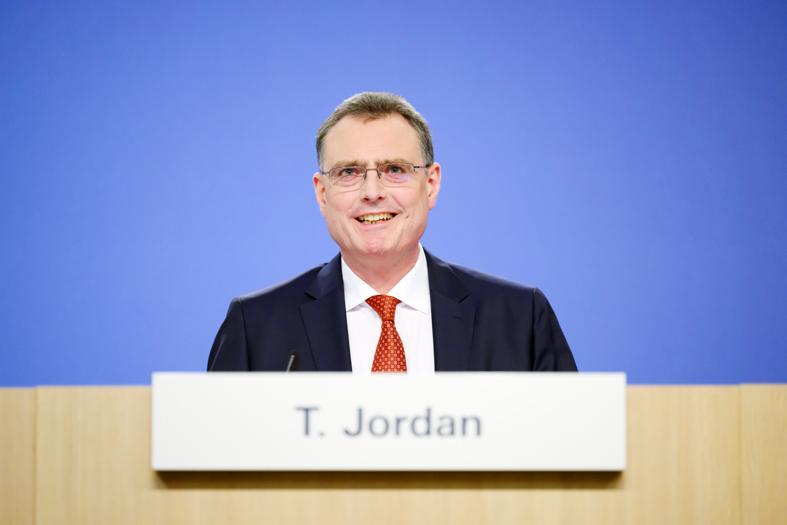The Swiss National Bank (SNB) yesterday unexpectedly increased interest rates for the first time since 2007, responding to a rise in inflation that officials worry could get out of hand.
It raised its policy rate by 50 basis points to minus-0.25 percent, a dramatic move that sent the Swiss franc surging about 2 percent against the euro, bringing parity between the two currencies into view.
Policymakers led by SNB Governing Board Chairman Thomas Jordan also said that more tightening might be needed, adding that they would remain “active” in the currency market.

Photo: EPA-EFE
Still, the SNB did not repeat its long-standing description of the franc as “highly valued,” as the mounting inflation danger forces it to shift away from a fixation on the haven currency.
The surprise decision came alongside a change in inflation outlook, which the SNB now sees at 2.8 percent this year, 1.9 percent next year and 1.6 percent in 2024. That is considerably higher than in March, when they predicted 2.1 percent this year and 0.9 percent next year and in 2024.
“It cannot be ruled out that further increases in the SNB policy rate will be necessary in the foreseeable future to stabilize inflation,” the SNB said in a statement.
The decision split investors and economists beforehand, with financial markets pricing in an increase in the main rate, but forecasters anticipating no change.
The SNB’s move came just hours after the US Federal Reserve intensified its own fight against rampant inflation with a 75 basis-point increase. The Bank of England was forecast to increase its benchmark rate later yesterday.
It also pre-empts a rate increase in the neighboring eurozone. The European Central Bank (ECB) — whose stance the SNB has tended to follow — would only start lifting rates next month, with another to follow in September.
The ECB’s tightening has already run into difficulty, with policymakers forced to hold an emergency meeting on Wednesday because of a rise in yields in some eurozone countries.
Deutsche Bank AG economists said the ECB’s pledge to create a tool to curb market stress in the eurozone would also allow it to raise interest rates faster than previously expected.
The ECB is expected to increase its deposit rate by 25 basis points next month and then by 50 basis points in September, October and December, analysts led by Mark Wall said on Wednesday.
That is an extra 50 basis-point hike than the bank’s prior forecast, and would lift the deposit rate to 1.25 percent by the end of this year.
“The ECB is deploying its anti-fragmentation tools earlier than we were expecting,” the economists wrote online. “This reduces uncertainties for the second half of the year. The deployment of the anti-fragmentation tools clears the pathway for policy rate liftoff and an accelerated tightening cycle.”

Real estate agent and property developer JSL Construction & Development Co (愛山林) led the average compensation rankings among companies listed on the Taiwan Stock Exchange (TWSE) last year, while contract chipmaker Taiwan Semiconductor Manufacturing Co (TSMC, 台積電) finished 14th. JSL Construction paid its employees total average compensation of NT$4.78 million (US$159,701), down 13.5 percent from a year earlier, but still ahead of the most profitable listed tech giants, including TSMC, TWSE data showed. Last year, the average compensation (which includes salary, overtime, bonuses and allowances) paid by TSMC rose 21.6 percent to reach about NT$3.33 million, lifting its ranking by 10 notches

Popular vape brands such as Geek Bar might get more expensive in the US — if you can find them at all. Shipments of vapes from China to the US ground to a near halt last month from a year ago, official data showed, hit by US President Donald Trump’s tariffs and a crackdown on unauthorized e-cigarettes in the world’s biggest market for smoking alternatives. That includes Geek Bar, a brand of flavored vapes that is not authorized to sell in the US, but which had been widely available due to porous import controls. One retailer, who asked not to be named, because

SEASONAL WEAKNESS: The combined revenue of the top 10 foundries fell 5.4%, but rush orders and China’s subsidies partially offset slowing demand Taiwan Semiconductor Manufacturing Co (TSMC, 台積電) further solidified its dominance in the global wafer foundry business in the first quarter of this year, remaining far ahead of its closest rival, Samsung Electronics Co, TrendForce Corp (集邦科技) said yesterday. TSMC posted US$25.52 billion in sales in the January-to-March period, down 5 percent from the previous quarter, but its market share rose from 67.1 percent the previous quarter to 67.6 percent, TrendForce said in a report. While smartphone-related wafer shipments declined in the first quarter due to seasonal factors, solid demand for artificial intelligence (AI) and high-performance computing (HPC) devices and urgent TV-related orders

Prices of gasoline and diesel products at domestic fuel stations are this week to rise NT$0.2 and NT$0.3 per liter respectively, after international crude oil prices increased last week, CPC Corp, Taiwan (台灣中油) and Formosa Petrochemical Corp (台塑石化) said yesterday. International crude oil prices last week snapped a two-week losing streak as the geopolitical situation between Russia and Ukraine turned increasingly tense, CPC said in a statement. News that some oil production facilities in Alberta, Canada, were shut down due to wildfires and that US-Iran nuclear talks made no progress also helped push oil prices to a significant weekly gain, Formosa said